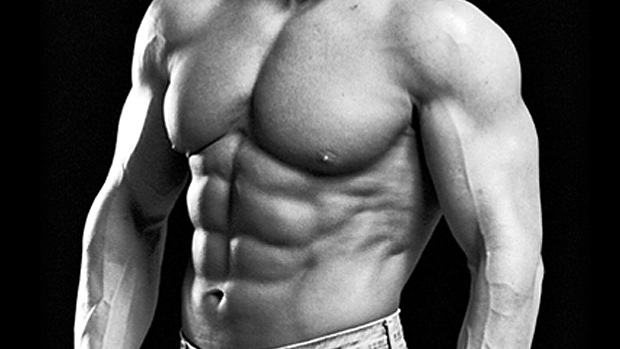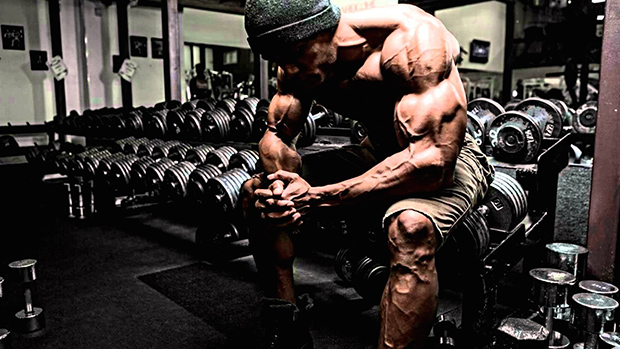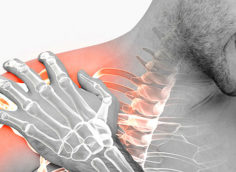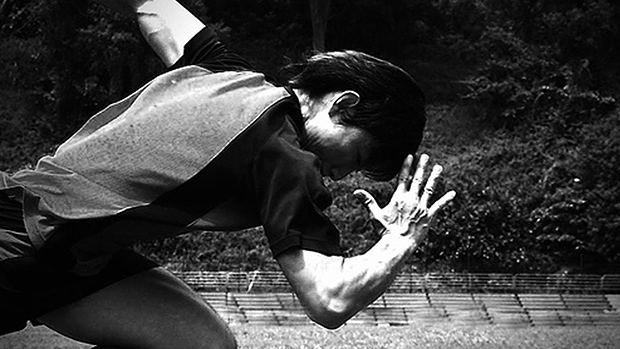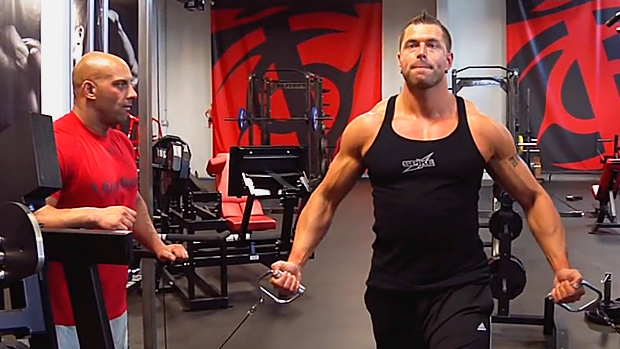If you're a regular reader of T Nation, you likely know that the whole "core" training concept is pure marketing hype.
Think about it: In the golden days of Muscle Beach and the Venice boardwalk, guys trained their midsections with sit-ups, crunches, and various lifting movements, and they probably had much stronger abs than most people walking around today.
Still, core training is an easy sell: After a few crunches, you can feel the "burn." Too bad that's lactic acid you're feeling, not progress!
Here's an analogy: suppose you walked into an 8 x 8 foot room filled with a million mosquitoes, armed with only a pair of fly swatters. After 10 minutes, you'd probably have torched a few hundred thousand of the bloodsuckers and built up one heck of a triceps pump. But how effective would such a "workout" be if your goal was to build up your triceps? Well, that's doing about as much for your arms as nouveau core training is for your abs.
Now it's definitely important for just about everyone to work his or her midsections. The benefits are overwhelming: improved posture, more stable midsection, better movement, and eliminating lower back pain. However, this can be accomplished in five to ten minutes per workout, with a few simple, non-retarded exercises.
Below are seven such movements. They're all guaranteed to improve your looks, your lifts, and your lower back health– without leaving you looking like the latest infomercial victim.
As athletes we perform standing up, so why do so many magazines only recommend exercises performed while lying down? They'll usually say that this is done in some half-ass attempt to "isolate" the abs. This explanation is a) wrong, and b) retarded.
First, the abs don't need to be isolated. They function as a stabilizer in most athletic functions. Second, trying to take the hip flexors out of all ab training movements is asking for trouble. Sure, if you're after only aesthetics, then isolating is a good idea at times– but always isolating can be problematic to long-term health.
The hip flexors and abs were designed to work together, so they should be trained together most of the time!
The Standing Cable Crunch is a perfect exercise to involve the abs in a dynamic fashion while standing.
The Setup
Simply attach a rope or strap to a high pulley station, walk out a step or so, and bend forward in a forceful but controlled manner. Return to the top slowly, flex, and explode down. You can change up the attachments and foot placements to change the exercise.
Do 3 to 5 sets of 5-10 reps. Yes, that's a far cry from the 500-rep nonsense the core training divas talk about. There's a reason for this: the abs are muscles– so train them like muscles! Don't be afraid to put some weight on the stack.
I learned about this exercise years back from Pavel Tsatsouline. It's an excellent movement for the obliques and abs. Forget standing on a Swiss ball; the FCT is functional ab training!
I've found that this exercise not only strengthens the abs but also helps with the ability to "pop" the hips. Both seasoned MMA fighters and weekend warriors who like to throw the occasional drunken punch at closing time will find this exercise helpful.
The Setup
Load one side of a barbell and stick the unloaded end in a corner or the corner of your rack. Stand to the left of the bar, facing it; the bar is perpendicular to your feet at this point. Grab the bar's sleeve and tighten your body, pivot and turn the bar until you almost face the corner. Keep your elbows locked throughout.
When you reach the other side, reverse motion.
- Keep your abs tight the entire time and lift slowly and smoothly. Do not jerk or speed through this lift!
- Don't twist your back while doing the FCT; it should be a smooth motion. Lower under control then flex and rotate back to the other side.
Again, 3 to 5 sets x 5 - 10 reps seems to work best. Add weight slowly; the majority of form problems I've seen have resulted from adding too much weight too quickly.
This is a great movement to really overload your abs; don't be afraid to go heavy on this one. This is the type of movement that'll pay huge dividends when it comes time to attempt a max squat or deadlift because you're exposing your abs to way more weight than you ever could with a simple crunch, or even weighted crunches.
The Setup
Simply set up as you would in a floor press or on a bench as in a bench press. Keep the bar locked out at arms' length and do a crunch. Don't let the arms drift back or forward. Concentrate on keeping the bar locked-in and flexing the hell out of your abs.
- Use dumbbells or kettlebells to crank up the intensity and place a different stress on the muscles.
- Try using one dumbbell or Kettlebell at a time to further increase intensity.
- Hold the top position for a second before returning to the starting position.
Do 3 sets of 6, but really load up the bar and go heavy!
Let's not forget the obliques. The average side bend just doesn't cut it when it comes to building a truly strong midsection. For anyone who wants to deadlift or squat real weights, the obliques must be strong.
The Suitcase Deadlift is old school and brutal. I've seen some very strong people humbled the first time they've tried this exercise.
The Setup
This movement is best done off the floor, but if you're having trouble, you can set the bar at about mid-shin level in the rack.
Stand to the side of the bar. Bend and set yourself in the same position you would to deadlift (back flat, chest up) and pick it up just as you would a suitcase. You can also use a Farmer's Walk bar if you have access to them.
Keep your abs flexed and your lower back tight throughout the movement. If you start twisting, stop and take some weight off the bar.
Three to 4 sets of 5 reps is sufficient with this toughie!
Most of you have probably never done this lift before. The Pitch Fork Lift (sometimes called the Shovel Lift) comes from Steve Justa, author of Rock, Iron, Steel, and is true functional training. It works the obliques as hard as any other movement I've ever come across.
If you've been having trouble with falling forward in the squat or haven't been able to properly push out against your belt when squatting or deadlifting, this movement will push your personal records to new heights.
The Setup
This one's easy to set up and perform. Load one end of an Olympic bar. Now, grab the unloaded end with one hand and place the other hand at about the midpoint of the bar.
Bend the knees and sideways at the hip and lift the loaded end of the bar, just as you would when shoveling dirt. You can make the movement much harder by then turning a bit to the side, as if "dumping" the dirt out of the shovel.
Return to the starting point and repeat. It will help if you lockout your arm farthest from the loaded end and "press" it down, levering the weight up.
Keep the reps under 6, and go for 3 to 5 sets.
Pavel re-popularized this movement in Bullet Proof Abs, but anyone who loves training movies fell in love with this exercise in Rocky IV.
This is an advanced exercise and you must already have very strong abs and great body control to do these properly.
The Setup
Lie down on a bench and grab it hard at head level (if your grip slips, you fall). Then, roll your body up so that your lats are pointing straight out at almost 90 degrees. Slowly lower yourself to about 45 degrees, then down as far as you can without touching the bench.
Use your abs to pull your legs back up to above 45 degrees. At first, you may need to start dropping to just below the starting position until you feel strong enough to go all the way down.
- Keep your body tight and straight
- Hold on to that bench!
The ab wheel is one of the original darlings of the infomercial scene, which is too bad since it's also one of the most kick-ass movements you can do.
The trick is, you have to do it properly: Simply rocking back and forth on your knees while holding a wheel will do about as much for your abs as a Thighmaster does for your quads.
Using an ab wheel properly is simple: Kneel down, roll out with the wheel, then pull yourself back up using your abs; don't jackknife the hips. Your hips should "tuck" a bit (the end position should look like a scared cat).
There's a big problem with the ab wheel that some of you seasoned guys can relate to: It's just too easy for anyone who's even moderately strong. Sure, you could run the reps way up, but who wants to count that high?
Here's the solution: use the ab wheel while standing. This variation is much harder and you need to have good body control and a strong back.
The Setup
Perform the exercise just as you would its kneeling variation, but standing up. When you reverse motion, your feet will act as "hooks" and pull you back to the top.
Start with low reps until you feel confident. Sets of 10 would be pretty damn strong, so shoot for that.
Rack Pulls aren't your traditional ab exercise– they're designed to hit the hams and back hard, along with helping improve your deadlift. But, as anyone who's ever tried them will know, your abdominals will take a beating if you're using heavy weight. Otherwise, you'll fall forward and lose the lift.
The Setup
Set up a bar at knee height (or just above or below the knee) in the rack; load it up, and deadlift it. This should be done as a heavy leg exercise with the benefit of hitting the abs, rather than as a direct abdominal movement.
Keep the reps low, 1 to 3 and the sets from 5 to 8.
If you compete in any sports or do any kind of powerlifting or Olympic lifting, I suggest training the abs three to five times per week. If you're training to look good, three times should be enough, but you can never really do too much ab work.
Just add one exercise to the end of your training sessions several times per week and you'll notice a huge improvement in both performance and looks!

